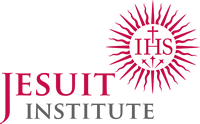| |
|
| Devising a school carol service |
The immediate origins of the Christmas Carol Service lie in the famous Festival of Nine Lessons and Carols at King's College, Cambridge, begun in 1918. But there is a much older Catholic tradition of the vigil of readings for Christmas.
A vigil liturgy consists of the pattern of
(a) a reading
(b) a reflection/response to the reading in the form of a psalm or song
(c) a collect-type prayer which draws together the themes of the reading.
This pattern is repeated however many times are suitable in the pastoral situation.
Some schools will end term quite a long time before Christmas. Consideration then needs to be given to whether it is appropriate to include some readings and songs which reflect the season of Advent.
Think about the dramatic impact of your liturgy. The story of the foretelling and birth of Christ, and the visits from the shepherds and the kings, form the structure - what you add, needs to be appropriate and unfold or meditate upon that narrative. Think visually (images, lights), and in terms of movement (procession, gesture, sitting and standing), as well as what is heard (readings and music).
Seven readings seems to work well for school carol services and (depending on the carols chosen) comes in at well under an hour.
The seven readings suggested are:
1. The foretelling of the Messiah (an Old Testament reading)
2. The angel Gabriel announces the news to Mary
3. Joseph and Mary travel to Bethlehem and Jesus is born
4. The shepherds
5. The wise men (or magi)
6. A non-scriptural reading, poem or drama
7. The witness of St John: the Word made flesh
There is also an introduction and a blessing.
The carols are a way of reflecting upon the scriptural readings and opening them up. There should be a mix of congregational and choir carols. The carol service should not be a concert or performance.
In choosing carols, for both congregation and choir, it s important to achieve a balance between quiet reflection and joyful rejoicing.
Some choir carols are suggested below. There are, of course, hundreds of carols and this is not intended to be any sort of defintive list. It is simply to suggest some carols that fit the pattern of readings. |
 King's College Cambridge - Festival of Nine Lessons and Carols King's College Cambridge - Festival of Nine Lessons and Carols
There are two examples of Vigils in the Roman Missal: one for Easter (p.397) and one for Pentecost (p.487) - these provide the model for a carol service in the Catholic tradition.
|
| Some things to think about |
How will you help people who are unused to worship?
Many who will come to your carol service may attend church only on this one occasion during the year. It is important that simple things are put in place that help them enter into the spirit of worship - they need to understand what is going on and not be afraid of embarrasment if they do the wrong thing.
- make sure they are welcomed, both by pupils who greet them and show them to their seats, and by the presider or head teacher at the start of the service
- be clear about expectations with regard to photographs and switching off mobile phones
- how will you indicate when to sit and stand?
- at the end, thank them for coming
- will you have a glass of mulled wine and a mince pie afterwards (make sure they know where it is and that they are welcome)
How will you begin your carol service?
Some ideas:
- begin with the sounding of a Christmas bell
- begin with the choir singing outside the chapel/church
- have a procession including servers, readers, choir, presider
process in the book of readings (see below)
- begin in darkness
- switch on lights as the first carol/hymn begins/finishes
- carry in the advent candles (some lit, some not according to where in Advent your carol service occurs) and place them into the Advent wreath
- begin with the Christmas Proclamation being dramatically spoken from a balcony
- begin with the Advent Prose
- begin traditionally with a soloist singing the first verse of Once in royal David's city
Are you going to do anything visual?
The carol service can be a liturgy of light - candles brought up and placed on altar (in glass holders) after each reading (or pairs of candles can increase participation and impact)
Consider using some simple imagery - a nativity, or simple sihouette,or figures from crib (brought up to match readings so that the crib scene is built up over the course of the carol service)
How will you highlight the readings from Scripture?
A carol service is a liturgy of the word, so it is important to draw attention to the word (the readings from Scripture) not just be reading but also visually. At Mass the book of the gospels is carried high, accompanied by lights and incense, and reverenced. Is there some way you can incorporate similar gestures in the carol service? For example, could the book of the readings be enshrined somewhwere and picked up and carried to the place from which the reading is proclaimed and then returned after each reading? Or could a candle be lit after each reading, the light increasing as the story unfolds?
Will you have a presider?
It is important in the Catholic tradition to have a presider at liturgy. If possible this should be a priest or deacon. If not a lay person.
Are you going to have a homily or reflection?
For some people this may be the only religious event in which they participate at Christmas. It is an opportunity to evangelize. A short homily or reflection, very well prepared, brief and to the point, could have a big catechetical impact.
Don't try and cover the whole Christmas story and theology of the incarnation - just focus on one image or offer one thought. Keep it simple.
Are you going to have a time of silence?
Silence is an important part of liturgy and should not be omitted from the carol service. Is there a moment, perhaps after the reading of the prologue of St John, or after the homily/reflection, when there could be silence. Silence works best when it is announced as such and the congregation is invited to meditate on something (the words of a reading, an image on a screen or in the service booklet, or a question to ask themselves this Christmas, etc.).
Is there an opportunity to use different languages?
Especially if your congregation comes from mixed cultural/language backgrounds, you may wish to consider reading one or more readings in different languages. The important thing is to make sure the congregation have the English translations - either in the service booklet or on a screen. You may also wish to consider having the seventh reading from St John in the original Greek.
Will you end by inviting people to do something practical in the spirit of Christmas?
eg. retiring collection for Crisis at Christmas, or The Passage, etc. Children with buckets or baskets at the doors as people leave
visit to the crib (and maybe the opportunity to bring gifts or make a donation.
Do you need to make it clear to the congregation that this is an act of worship not a concert?
You may need to remind the congregation that this is an act of worhip and therefore there is no applause. Except that, at the end, you might wish to thank the singers and readers, etc. and applaud then. For similar reasons people should be discouraged from using the phones to record or photograph the carol service.
Sitting and standing
One of the things that makes a carol service feel like a concert is if the congregation sits for the whole time. Standing for the entrance/introduction, the prayers, and the blessing, makes the carol service a liturgy. The congregation should also stand for congregational carols.
Do you want to extend the carol service with some secular Christmas music?
The choir could process out of the chapel and sing as people leave or regroup where the hospitality is being held after the carol sercice and sing some secular seasonal music.
Are you going to have hospitality after the carol service?
Do you want to have anything for people to take away?
Your carol service may be the only contact some people have with the proclamation of Chriist's birth at Christmas. Giving them some small token to take from the carol service back to their homes is an opportunity for evagelization. This may for some be the only sacred thing in their home at Christmas.
Some suggestions:
- a simple prayer card
- a Christmas card from the school community or chaplaincy
- a finger angel
- a christingle
|
 Advent Prose ( Advent Prose ( Latin text / Latin text /  English text) English text)
|
The Readings, Carols and Prayers |
 Readings and prayer texts (MS Word) Readings and prayer texts (MS Word)
 Presider's prayers and the blessing (MS Word) Presider's prayers and the blessing (MS Word)
|
|
| The Carol Service |
|
Processional Carol
Once in royal David's city
Alternative processional carols
Come, come, come to the manger
O come, O come, Emmanuel
|
|
Greeting
In the name of the Father, + and of the Son, and of the Holy Spirit. Amen.
The Lord be wth you. And with your spirit.
Some words of welcome and explanation. |
|
The Christmas Bidding Prayer
by
Eric Milner-White (King's College Cambridge, 1918)
Beloved in Christ,
be it this Christmastide our care and delight
to hear again the message of the angels,
and in heart and mind to go even unto Bethlehem
and see this thing which is come to pass,
and the babe lying in a manger.
Therefore let us read and mark in holy scripture
the tale of the loving purposes of God
from the first days of our disobedience
unto the glorious redemption brought us by this holy child.
But first, let us pray for the needs of the whole world:
for peace on earth and goodwill among all his people;
for unity and brotherhood within the Church he came to build,
and especially in this holy place.
And because this of all things would rejoice his heart,
let us remember, in his name, the poor and helpless,
the cold, the hungry, and the oppressed;
the sick and them that mourn,
the lonely and the unloved,
the aged and the little children;
all those who know not the Lord Jesus,
or who love him not,
or who by sin have grieved his heart of love.
Lastly, let us remember before God
all those who rejoice with us, but upon another shore,
and in a greater light,
that multitude which no man can number,
whose hope was in the Word made flesh,
and with whom in the Lord Jesus we are for ever one.
These prayers and praises
let us humbly offer up to the throne of heaven,
in the words which Christ himself hath taught us:
Our Father . . .
The almighty God bless us with his grace;
Christ give us the joys of everlasting life;
and unto the fellowship of the citizens above
may the King of angels bring us all.
Amen. |
 print Christmas Bidding Prayer print Christmas Bidding Prayer
 alternative Advent Prayer alternative Advent Prayer
|
First Reading
Isaiah 9:1-6 JB
The prophet Isaiah foretells the birth of a Messiah, from the royal line of David, the Christ who will rule in peace without end.
The people that walked in darkness has seen a great light; on those who live in a land of deep shadow a light has shone. You have made their gladness greater, you have made their joy increase; they rejoice in your presence as men rejoice at harvest time, as men are happy when they are dividing the spoils. For the yoke that was weighing on him, the bar across his shoulders, the rod of his oppressor, these you break as on the day of Midian. For all the footgear of battle, every cloak rolled in blood, is burnt, and consumed by fire. For there is a child born for us, a son given to us and dominion is laid on his shoulders; and this is the name they give him: Wonder-Counsellor, Mighty-God, Eternal-Father, Prince-of-Peace. Wide is his dominion in a peace that has no end, for the throne of David and for his royal power, which he establishes and makes secure in justice and integrity.
The word of the Lord.
Thanks be to God. |
 print first reading (JB translation) - large print version for readers print first reading (JB translation) - large print version for readers
alternative readings
 Genealogy of Jesus the Messiah Genealogy of Jesus the Messiah
 Christmas Proclamation Christmas Proclamation |
| |
Carols after the first reading
Awake from your slumber
O come, O come, Emmanuel
On Christmas night, all Christians sing
The race that long in darkness pined
Choir carols
 Adam lay ybounden Adam lay ybounden
 Advent Prose ( Advent Prose ( Latin text / Latin text /  English text) English text)
 O Morgenstern (Pärt) O Morgenstern (Pärt)
|
|
| |
Prayer after first reading and carols
Let us pray.
Father,
through all the ages you have called your people from darkness into light,
making their gladness greater and their joy increase.
As we celebrate a child born for us, a son given to us,
make the light of Christ bright in our own hearts
that we may once more bring peace and reconciliation to our families,
our communities, and to our world.
Through Christ our Lord.
Amen. |
 print prayers print prayers |
Second Reading
Luke 1:26-38 JB
St Luke tells how the angel Gabriel announces to Mary that she is to give birth to a Son through the power of the Holy Spirit. And the child will be called holy, the Son of God.
In the sixth month the angel Gabriel was sent by God to a town in Galilee called Nazareth, to a virgin betrothed to a man named Joseph, of the House of David; and the virgin's name was Mary. He went in and said to her, 'Rejoice, so highly favoured! The Lord is with you.' She was deeply disturbed by these words and asked herself what this greeting could mean, but the angel said to her, 'Mary, do not be afraid; you have won God's favour. Listen! You are to conceive and bear a son, and you must name him Jesus. He will be great and will be called Son of the Most High. The Lord God will give him the throne of his ancestor David; he will rule over the House of Jacob for ever and his reign will have no end.' Mary said to the angel, 'But how can this come about, since I am a virgin?' 'The Holy Spirit will come upon you' the angel answered 'and the power of the Most High will cover you with its shadow. And so the child will be holy and will be called Son of God. Know this too: your kinswoman Elizabeth has, in her old age, herself conceived a son, and she whom people called barren is now in her sixth month, for nothing is impossible to God' 'I am the handmaid of the Lord,' said Mary 'let what you have said be done to me.' And the angel left her.
The word of the Lord.
Thanks be to God. |
 print second reading (JB translation) - large print version for readers print second reading (JB translation) - large print version for readers
|
| |
Carols after the second reading
The angel Gabriel to Mary came
Choir carols
A Hymn to the Virgin (Britten) 
A spotless rose (Howells)
 |
|
| |
Prayer after the second reading and carols
Let us pray.
Father,
opening her heart to the power of your Holy Spirit,
the virgin Mary was covered with your shadow
and she conceived a child most holy,
and he was called Son of God.
Open our hearts this Christmas time
to the presence of your Spirit working in us
that we may rejoice in your favour,
and bring again the Christ-child into our world.
Through Christ our Lord. Amen. |
 print prayers print prayers |
Third Reading
Luke 2:1-7 JB
St Luke tells how Joseph and Mary travel to Bethlehem to register their names on a census of the whole world. And, while they are there, Jesus is born and laid in a manger.
Now at this time Caesar Augustus issued a decree for a census of the whole world to be taken. This census, the first, took place while Quirinius was governor of Syria, and everyone went to his own town to be registered. So Joseph set out from the town of Nazareth in Galilee and travelled up to Judaea, to the town of David called Bethlehem, since he was of David's House and line, in order to be registered together with Mary, his betrothed, who was with child. While they were there the time came for her to have her child, and she gave birth to a son, her first born. She wrapped him in swaddling clothes, and laid him in a manger because there was no room for them at the inn.
The word of the Lord.
Thanks be to God. |
 print third reading (JB translation) - large print version for readers print third reading (JB translation) - large print version for readers
|
| |
Carols after the third reading
Away in a manger
God rest ye, merry gentlemen
In the bleak mid winter
Little Jesus, sweetly sleep
O little town of Bethlehem
See, amid the winter's snow
Sleep, holy babe
Choir carols
 Bethlehem Down (Warlock) Bethlehem Down (Warlock)
 Coventry Carol Coventry Carol
 I wonder as I wander I wonder as I wander
 Lullaby my Jesus (Warlock) Lullaby my Jesus (Warlock)
 Nativity Carol: Born in a stable so bare (Rutter) Nativity Carol: Born in a stable so bare (Rutter)
|
|
| |
Prayer after the third reading and carols
Let us pray.
Father,
Jesus, your Son, was of David’s royal house and line
yet there was no room for him at the inn
and he was laid in a manger
with the ox and ass as company.
In our celebrations this Christmas,
let us not forget the poor and the lonely,
the homeless and those fleeing poverty and persecution
and, in thought and deed, share our riches with them.
Through Christ our Lord. Amen. |
 print prayers print prayers |
Fourth Reading
Luke 2:8-20 JB
St Luke tells how the angel of the Lord appears to shepherds tending their flocks in the fields. And the shepherds go to Bethlehem and find the baby lying in the manger.
In the countryside close by there were shepherds who lived in the fields and took it in turns to watch their flocks during the night. The angel of the Lord appeared to them and the glory of the Lord shone round them. They were terrified, but the angel said, 'Do not be afraid. Listen, I bring you news of great joy, a joy to be shared by the whole people. Today in the town of David a saviour has been born to you; he is Christ the Lord. And here is a sign for you: you will find a baby wrapped in swaddling clothes and lying in a manger.' And suddenly with the angel there was a great throng of the heavenly host, praising God and singing: 'Glory to God in the highest heaven, and peace to men who enjoy his favour.' Now when the angels had gone from them into heaven, the shepherds said to one another, 'Let us go to Bethlehem and see this thing that has happened which the Lord has made known to us'. So they hurried away and found Mary and Joseph, and the baby lying in the manger. When they saw the child they repeated what they had been told about him, and everyone who heard it was astonished at what the shepherds had to say. As for Mary, she treasured all these things and pondered them in her heart. And the shepherds went back glorifying and praising God for all they had heard and seen; it was exactly as they had been told.
The word of the Lord.
Thanks be to God. |
 print fourth reading (JB translation) - large print version for readers print fourth reading (JB translation) - large print version for readers
|
| |
Carols after the fourth reading
Angels we have heard in heaven
Angels we have heard on high
Come, come, come to the manger
In the bleak midwinter
Infant holy, infant lowly (Polish carol)
It came upon the midnight clear
Silent night
While shepherds watched
Choir carols
 Dutch Carol (Macmillan) [This carol was written for St Aloysius College Junior School, Glasgow] Dutch Carol (Macmillan) [This carol was written for St Aloysius College Junior School, Glasgow]
 On Christmas night all Christians sing On Christmas night all Christians sing
 The Shepherds' Pipe Carol (Rutter) The Shepherds' Pipe Carol (Rutter)
|
|
| |
Prayer after the fourth reading and carols
Let us pray.
Father,
you sent angels to the shepherds
as they watched their flocks by night,
bringing them news of great joy:
a Saviour born to us, who is Christ the Lord.
May we not be afraid to share with all whom we meet
the good news of your salvation,
peace and God’s favour for everyone who hears it
and ponders it in their heart.
Through Christ our Lord.Amen. |
 print prayers print prayers |
Fifth Reading
Matthew 2:1-12 JB
St Matthew tells how the wise men travel from the east, following the light of a star. They bring gifts of gold, frankincense and myrrh for the infant king.
After Jesus had been born at Bethlehem in Judaea during the reign of King Herod, some wise men came to Jerusalem from the east. 'Where is the infant king of the Jews?' they asked. 'We saw his star as it rose and have come to do him homage.' When King Herod heard this he was perturbed, and so was the whole of Jerusalem. He called together all the chief priests and the scribes of the people, and enquired of them where the Christ was to be born. 'At Bethlehem in Judaea,' they told him 'for this is what the prophet wrote: And you, Bethlehem, in the land of Judah, you are by no means least among the leaders of Judah, for out of you will come a leader who will shepherd my people Israel'. Then Herod summoned the wise men to see him privately. He asked them the exact date on which the star had appeared, and sent them on to Bethlehem. 'Go and find out all about the child,' he said 'and when you have found him, let me know, so that I too may go and do him homage.' Having listened to what the king had to say, they set out. And there in front of them was the star they had seen rising; it went forward, and halted over the place where the child was. The sight of the star filled them with delight, and going into the house they saw the child with his mother Mary, and falling to their knees they did him homage. Then, opening their treasures, they offered him gifts of gold and frankincense and myrrh. But they were warned in a dream not to go back to Herod, and returned to their own country by a different way.
The word of the Lord.
Thanks be to God.
|
 print fifth reading (JB translation) - large print version for readers print fifth reading (JB translation) - large print version for readers |
| |
Carols after the fifth reading
As with gladness men of old
Bethlehem, of noblest cities
Brightest and best of the sons of the morning
O worship the Lord in the beauty of holiness
The first nowell
Unto us is born a Son
We three kings of orient are
Choir carols
 Coventry Carol Coventry Carol
Lully, lulla, thou little tiny child (Leighton)
 Videntes stellam (Poulenc) Videntes stellam (Poulenc)
|
|
| |
Prayer after the fifth reading and carols
Let us pray.
Father,
the Wise Men saw the star as it rose
and it filled them with delight;
and they came to do the Christ-child homage
offering him gifts of gold, frankincense and myrrh
from their treasures.
May we follow your signs and wonders
in our everyday world,
as they reveal the presence of Christ to us
in those around us.
Through Christ our Lord. Amen. |
 print prayers print prayers |
Sixth Reading
A Non-Scriptural Reading, Poem or Drama
['The word of the Lord' is not said at the end of a non-scriptural reading.] |
 suggested texts for non-scriptural sixth reading suggested texts for non-scriptural sixth reading |
| |
Carols after the sixth reading
Ding, dong, merrily on high!
How dark was the stable
The Virgin Mary had a baby boy
Choir carols
I saw three ships
O holy night (Adam) 
What cheer? (Walton) |
|
| |
Prayer after the sixth reading and carols
Let us pray.
Father,
shepherds and kings witnessed the birth of Jesus
at Bethlehem
and departed with good news for all people of good will.
With each passing year,
as we rejoice anew at the coming of Christ,
may we deepen our understanding
of the gift of your Son
who is your compassion and mercy,
your grace and salvation,
your repeated offer of hope
for the whole world.
Through Christ our Lord.
Amen. |
 print prayers print prayers |
| The Seventh Reading, from the Prologue of St John is usually treated in a different way from the other readings. The gospel book could be processed (as at Mass) or people could stand, or it could be sung, or an Alleluia acclamation sung. |
|
Seventh Reading
John 1:1-14 NSRV
In the beginning was the Word,
and the Word was with God,
and the Word was God.
He was in the beginning with God.
All things came into being through him,
and without him not one thing came into being.
What has come into being in him was life,
and the life was the light of all people.
The light shines in the darkness,
and the darkness did not overcome it.
There was a man sent from God,
whose name was John. He came as a witness to testify to the light,
so that all might believe through him. He himself was not the light,
but he came to testify to the light.
The true light, which enlightens everyone,
was coming into the world.
He was in the world,
and the world came into being through him;
yet the world did not know him. He came to what was his own,
and his own people did not accept him.
But to all who received him,
who believed in his name,
he gave power to become children of God,
who were born,
not of blood or of the will of the flesh
or of the will of man, but of God.
And the Word became flesh
and lived among us,
and we have seen his glory,
the glory as of a father’s only son, full of grace and truth.
The word of the Lord.
Thanks be to God. |
 print seventh reading (NRSV translation) - large print version for readers print seventh reading (NRSV translation) - large print version for readers
 text in Greek & English (NRSV) with transliteration text in Greek & English (NRSV) with transliteration
|
| |
Carols after the seventh reading
A child is born for us today (Norbet)
A child is born in Bethlehem
It came upon the midnight clear
Let all mortal flesh keep silence
Love came down at Christmas (Rossetti)
Of the Father's heart begotten
What child is this
Choir carols
O holy night (Adam) 
O magnum mysterium (Lauridsen)

Lux aurumque (Whitacre)
 |
|
| |
Prayer after the seventh reading and carols
Let us pray.
Father,
from all eternity
your Word is with you
and is you,
and all that is
came into being through your Word.
Yet, in the fullness of time,
this same word became flesh,
one like us,
and lived among us,
the glory of a father’s only Son,
full of grace and truth.
May we, once again this Christmas,
come silently in wonder and awe
as your life and light,
is given to us:
Jesus the Lord.
Through Christ our Lord. Amen. |
 print prayers print prayers |
Homily or Reflection |
|
The Blessing
The Lord be with you. And with your spirit.
When he came to us as a man, the Son of God scattered the darkness of this world, and filled this holy night with his glory. May the God of infinite goodness scatter the darkness of sin and brighten our hearts with holiness. Amen.
God sent his angels to shepherds to herald the great joy of our Saviour’s birth. May he fill us with joy and make us heralds of his gospel. Amen.
When the Word became flesh, earth was joined to heaven. May he give you his peace and good will, and fellowship with all the heavenly host. Amen.
And may the blessing of almighty God, Father, + Son and Holy Spirit, come down upon you and remain with you always. Amen.
Go in the peace of Christ, announcing the good news of Jesus' birth. Thanks be to God. |
 print Blessing print Blessing |
| |
Final/Recessional carol
Hark! The herald angels sing
O come, all ye faithful
Joy to the world
|
|
| Christmas readings, poems and drama |
An Advent Prayer
adapted from the Roman Liturgy Advent Preface II
In praise and thanksgiving,
let us rejoice as we await our Saviour,
Christ the Lord,
God-with-us,
Prince of peace.
For all the oracles of the prophets foretold him;
the Virgin Mary longed for him with love beyond all telling;
John the Baptist sang of his coming
and proclaimed his presence when he came.
It is by his gift that we already rejoice at the mystery of his nativity,
so that he may find us watchful in prayer
and exultant in his praise. |
|
The Genealogy of Jesus the Messiah
Matthew 1:1-16
NRSV
An account of the genealogy of Jesus,
the Messiah,
the son of David,
the son of Abraham:
Abraham was the father of Isaac,
and Isaac the father of Jacob,
and Jacob the father of Judah and his brothers,
and Judah the father of Perez and Zerah by Tamar,
and Perez the father of Hezron,
and Hezron the father of Aram,
and Aram the father of Aminadab,
and Aminadab the father of Nahshon,
and Nahshon the father of Salmon,
and Salmon the father of Boaz by Rahab,
and Boaz the father of Obed by Ruth,
and Obed the father of Jesse,
and Jesse the father of King David.
And David was the father of Solomon by the wife of Uriah,
and Solomon the father of Rehoboam,
and Rehoboam the father of Abijah,
and Abijah the father of Asaph,
and Asaph the father of Jehoshaphat,
and Jehoshaphat the father of Joram,
and Joram the father of Uzziah,
and Uzziah the father of Jotham,
and Jotham the father of Ahaz,
and Ahaz the father of Hezekiah,
and Hezekiah the father of Manasseh,
and Manasseh the father of Amos,
and Amos the father of Josiah,
and Josiah the father of Jechoniah and his brothers,
at the time of the deportation to Babylon.
And after the deportation to Babylon:
Jechoniah was the father of Salathiel,
and Salathiel the father of Zerubbabel,
and Zerubbabel the father of Abiud,
and Abiud the father of Eliakim,
and Eliakim the father of Azor,
and Azor the father of Zadok,
and Zadok the father of Achim,
and Achim the father of Eliud,
and Eliud the father of Eleazar,
and Eleazar the father of Matthan,
and Matthan the father of Jacob,
and Jacob the father of Joseph the husband of Mary,
of whom Jesus was born,
who is called the Messiah. |
|
The Christmas Proclamation
adapted from the United States Conference of Catholic Bishops' version (1994) of the traditional Christmas Proclamation
Today, [the twenty-fifth day of December,]
unknown ages from the time when God created the heavens and the earth
and then formed man and woman in his own image.
Several thousand years after the flood,
when God made the rainbow shine forth as a sign of the covenant.
Twenty-one centuries from the time of Abraham and Sarah;
thirteen centuries after Moses led the people of Israel out of Egypt.
Eleven hundred years from the time of Ruth and the Judges;
one thousand years from the anointing of David as king;
in the sixty-fifth week according to the prophecy of Daniel.
In the one hundred and ninety-fourth Olympiad;
the seven hundred and fifty-second year from the foundation of the city of Rome.
The forty-second year of the reign of Octavian Augustus;
the whole world being at peace,
Jesus Christ, eternal God and Son of the eternal Father,
desiring to sanctify the world by his most merciful coming,
being conceived by the Holy Spirit,
and nine months having passed since his conception,
was born in Bethlehem of Judea of the Virgin Mary.
The Nativity of our Lord Jesus Christ according to the flesh. |
 musical setting of the Christmas Proclamation musical setting of the Christmas Proclamation |
The Burning Babe
from St Peter's Complaint (1595)
by St Robert Southwell SJ (1561-95)
As I in hoary winter's night stood shivering in the snow,
Surprised I was with sudden heat which made my heart to glow ;
And lifting up a fearful eye to view what fire was near,
A pretty babe all burning bright did in the air appear ;
Who, scorchëd with excessive heat, such floods of tears did shed
As though his floods should quench his flames which with his tears were fed.
Alas, quoth he, but newly born in fiery heats I fry,
Yet none approach to warm their hearts or feel my fire but I!
My faultless breast the furnace is, the fuel wounding thorns,
Love is the fire, and sighs the smoke, the ashes shame and scorns;
The fuel justice layeth on, and mercy blows the coals,
The metal in this furnace wrought are men's defilëd souls,
For which, as now on fire I am to work them to their good,
So will I melt into a bath to wash them in my blood.
With this he vanished out of sight and swiftly shrunk away,
And straight I callëd unto mind that it was Christmas day.
|
|
The Nativity of Christ
St Robert Southwell SJ (1561-95)
Behold the father is his daughter's son,
The bird that built the nest is hatch'd therein,
The old of years an hour hath not outrun,
Eternal life to live doth now begin,
The word is dumb, the mirth of heaven doth weep,
Might feeble is, and force doth faintly creep.
O dying souls! behold your living spring!
O dazzled eyes! behold your sun of grace!
Dull ears attend what word this word doth bring!
Up, heavy hearts, with joy your joy embrace!
From death, from dark, from deafness, from despairs,
This life, this light, this word, this joy repairs.
Gift better than Himself God doth not know,
Gift better than his God no man can see;
This gift doth here the giver given bestow,
Gift to this gift let each receiver be:
God is my gift, Himself He freely gave me,
God's gift am I, and none but God shall have me.
Man alter'd was by sin from man to beast;
Beast's food is hay, hay is all mortal flesh;
Now God is flesh, and lies in manger press'd,
As hay the brutest sinner to refresh:
Oh happy field wherein this fodder grew,
Whose taste doth us from beasts to men renew! |
|
Journey of the Magi
by
T.S. Eliot (1927)
A cold coming we had of it,
Just the worst time of the year
For a journey, and such a long journey:
The ways deep and the weather sharp,
The very dead of winter.
And the camels galled, sore-footed, refractory,
Lying down in the melting snow.
There were times we regretted
The summer palaces on slopes, the terraces,
And the silken girls bringing sherbet.
Then the camel men cursing and grumbling
And running away, and wanting their liquor and women,
And the night-fires going out, and the lack of shelters,
And the cities hostile and the towns unfriendly
And the villages dirty and charging high prices:
A hard time we had of it.
At the end we preferred to travel all night,
Sleeping in snatches,
With the voices singing in our ears, saying
That this was all folly.
Then at dawn we came down to a temperate valley,
Wet, below the snow line, smelling of vegetation;
With a running stream and a water-mill beating the darkness,
And three trees on the low sky,
And an old white horse galloped away in the meadow.
Then we came to a tavern with vine-leaves over the lintel,
Six hands at an open door dicing for pieces of silver,
And feet kicking the empty wine-skins.
But there was no information, and so we continued
And arrived at evening, not a moment too soon
Finding the place; it was (you may say) satisfactory.
All this was a long time ago, I remember,
And I would do it again, but set down
This set down
This: were we led all that way for
Birth or Death? There was a Birth, certainly,
We had evidence and no doubt. I had seen birth and death,
But had thought they were different; this Birth was
Hard and bitter agony for us, like Death, our death.
We returned to our places, these Kingdoms,
But no longer at ease here, in the old dispensation,
With an alien people clutching their gods.
I should be glad of another death. |
 a dramatic reading for three voices a dramatic reading for three voices
 TS Eliot reading Journey of the Magi TS Eliot reading Journey of the Magi
|
Ecce puer
James Joyce (1882-1941)
Of the dark past
a child is born.
With joy and grief
my heart is torn.
Calm in his cradle
the living lies.
May love and mercy
unclose his eyes!
Young life is breathed
on the glass;
The world that was not
comes to pass.
A child is sleeping:
an old man gone.
O, father forsaken,
forgive your son! |
|
Infant joy
from Songs of Innocence (1789)
by William Blake (1757-1827)
‘I have no name:
I am but two days old.’
What shall I call thee?
‘I happy am,
Joy is my name.’
Sweet joy befall thee!
Pretty joy!
Sweet joy, but two days old.
Sweet joy I call thee:
Thou dost smile,
I sing the while,
Sweet joy befall thee! |
|
The Contemplation on the Incarnation of St Ignatius
from a contemporary reading of the Spiritual Exercises by David Fleming SJ (cf. Spiritual Exercises n.101ff)
I try to enter into the vision of God, in his triune life,
looking upon our world:
men and women aimless, despairing,
hateful and killing,
men and women sick and dying,
the old and the young,
the rich and the poor,
the happy and the sad,
some being born and some being laid to rest.
The leap of divine joy:
God knows that the time has come
when the mystery of his salvific plan,
hidden from the begining of the world,
will become manifest. |
|
The Small Earth
origin unknown
If the earth were only a few feet in diameter, floating a few feet above a field somewhere, people would come from everywhere to marvel at it. People would walk around it, marvelling at its big pools of water, its little pools, and the water flowing between the pools. People would marvel at the bumps on it, and the holes in it, and they would marvel at the very thin layer of gas surrounding it, and the water suspended in the gas. People would marvel at all the creatures walking around the surface of the ball, and at the creatures in the water. The people would declare it precious because it was the only one, and they would protect it so that it would not be hurt. The ball would be the greatest wonder known, and people would come to behold it, to be healed, to gain knowledge, to know beauty, and to wonder how it could be. People would love it, and defend it with their lives, because they would somehow know that their lives, their own roundness, could be nothing without it. If the earth were only a few feet in diameter. |
|
It's a Birthday
It's a birthday, a birthday!
Who must we invite?
Neighbours, friends and family,
that surely must be right.
But 'no, not these' says God,
'I've someone else in mind:
the outsider and unrecognised,
the ones life leaves behind.
They'll be first to see
the baby come as God on earth,
and join in praise to me.'
Now I see that no one is
an outsider to our God.
Inside God's love, there's room for all
however strange and odd! |
 from Barnabas Children's Ministry from Barnabas Children's Ministry |
Come Immanuel
Godfrey Rust (b.1953)
Come, Immanuel, God with us to be.
Come down from paradise and occupy
this dirty stable of humanity.
Come and live rough, as we do: come and die.
Come and be lonely as an orphaned child.
Come to where grief is harvested and stored.
Come to where empty agèd minds run wild.
Come to the hospice and the cancer ward.
Come, flee from tyrants as a refugee.
Come, be betrayed by those you counted friends.
Come and be tortured with no amnesty.
Come as the means to justify all ends.
Come and be broken like a Christmas toy.
Come, be completely human—then we’ll know
your sorrow may bring hope of lasting joy
and God above is God with us below.
Immanuel (or Emmanuel) = Hebrew for 'God with us'
|
 (c) Godfrey Rust (c) Godfrey Rust
St John's Church, West Ealing (2003) |
A Poem for Christmas Eve
Godfrey Rust (b.1953)
This is a love story, if you can accept it,
that God the father looked down at his world
and the world was like a sleeping, fitful child
and the child was spoiled.
Its nations called each other names
and roamed earth's playground like a gang of boys
who choose sides, always brandishing
their terrifying toys.
The world thought it was fatherless and hunted
restlessly for some new sign or token
as if Christmas had come and gone, its presents all unwrapped,
already broken,
and the father God looked at his child
and counted the cost of love's freedom: but he had a plan,
to step from out of time and into history
and become a man.
With eternity to find the spot he chose
with the greatest care. One night a workman stood
in a barn with a group of animals
watching the birth of God
while out on the hills some shepherds were astonished
as a skyful of angels appeared then disappeared,
and a few astrologers saw a change in the stars
they'd studied for years
and almost everyone else knew nothing.
Caesar turned and settled in his luxurious bed
while in Bethlehem the power and the glory
bawled for milk in a shed.
It was quite an entrance. The only Son of God
homeless, illegitimate, a refugee,
owning nothing but the world that he grew up in
had made himself quite empty,
his birth itself a kind of dying where
he abdicated power, omniscience,
was needy, hated and misunderstood
and after the last violence
he was laid in the womb of a grave for the birth
which Bethlehem merely anticipated
and for which the blind, brave, barricaded
spoiled world waited—
no sage or rustic came with gifts,
only some women, hopelessly brave,
brought spices in the dark of morning
to an empty grave.
Two deaths, two births, the manger and the cross:
the first brought hope, the second brought salvation.
Out of his poverty this child has made us rich
beyond imagination,
and on a winter evening in a suburban home
a father looks down at his sleeping child.
The room is warm and brightly lit. Outside
the night is darkly wild,
and the child that sleeps knows well that she is loved,
and in her bones knows how to disobey,
and she will learn that none is innocent,
that death takes all away,
and the father looking at her peaceful face
feels his own helplessness and counts the cost
of the love between them in a spoiled world
where all must end in loss
but for Bethlehem and Calvary. These births
have brought an end to death,
and the child in the manger is the Lord
we feed on in our hearts by faith
now and forever. Child, if you would wake
on this Christmas Eve outside you'd find
a star, not a streetlamp. Listen, you can hear
the angels' message in the wind. |
 (c) Godfrey Rust (c) Godfrey Rust
St John's Church, West Ealing (1988) |
Gloria
Bishop Thomas Ken (1637-1711)
Glory to God in the highest, and on earth peace, goodwill towards men; for unto us is born this day a Saviour who is Christ the Lord. We praise thee, we bless thee, we glorify thee, we give thanks to thee for this greatest of thy mercies, O Lord God, heavenly King, God the Father almighty. |
|
Advent Angels
Alfred Delp SJ (1907-45)
I see Advent with greater intensity and anticipation than ever before. Walking up and down in my cell, three paces this way and three paces that way, with my hands in irons and ahead of me an uncertain fate, I have a new and different understanding of God’s promise of redemption and release.
Two years ago I was given a little angel for Advent. It bore the inscription, 'Rejoice, for the Lord is near.' A bomb destroyed the angel and killed the man who gave it to me. I feel he is doing me the service of an angel now.
The horror of war would be unendurable unless we kept being encouraged by the promises that have been spoken. There always are angels of annunciation, speaking their message of good news into the midst of anguish, scattering their seed of blessing that will spring up one day in the midst of the night. They call us to hope. These are not yet the loud angels of rejoicing and fulfillment that come out into the open, like the angels of the first Christmas. Quiet, inconspicuous, they come into rooms and hearts as they did then. Quietly they bring God’s questions and proclaim to us the wonders of God, for whom nothing is impossible.
If we want to be alive, then we must first believe in the golden seed of God that the angels have scattered and are still offering to open hearts. Then we must walk through the gray days of our time as announcing messengers. so many need their courage strengthened, so many are in despair and in need of comfort, there is so much harshness that needs a gentle hand and an illuminating word, so much loneliness crying out for a word of release, so much loss and pain in search of inner meaning! God’s messengers know that the Lord is casting seed of blessing into these hours of history as well.
Understanding this world in the light of Advent means to endure in faith, waiting for the fertility of the silent earth, the abundance of the coming harvest—not because we put our trust in the earth but because we have heard God’s message and have met one of God’s angels ourselves.
Advent is the time of promise; it is not yet the time of fulfillment.
From afar sound the first notes, not yet discernible as a song or melody. The new song of God’s future is still far off and only just announced and foretold. But fulfillment is happening. It is occurring today. And tomorrow the angels will tell what has happened with loud, rejoicing voices, and we will know it and be glad. |
|
The Time Draws Near
Alfred Lord Tennyson (1809-92)
The time draws near the birth of Christ:
the moon is hid; the night is still;
the Christmas bells from hill to hill
answer each other in the mist.
Four voices of four hamlets round,
from far and near, on mead and moor,
swell out and fail, as if a door
were shut between me and the sound:
Each voice four changes on the wind,
that now dilate, and new decrease,
“Peace and goodwill, goodwill and peace,
peace and goodwill, to all mankind.” |
|
More Christmas poems and readings
 Poems and Readings for Christmas Poems and Readings for Christmas
 Barnabas Children's Ministry - Christmas Barnabas Children's Ministry - Christmas
 Christmas Poetry Christmas Poetry
|
|
| The Christmas Crib |
The tradition of the Christmas Crib begins with St Francis of Assisi (1181-1226).
The Ox traditionally represents the Jewish people, from whose stock Jesus came, and who longed for a Messiah. The Ass represents the Gentiles (the non-Jewish peoples) whom Jesus also comes to save. |
|
| Images for a Carol Service booklet |
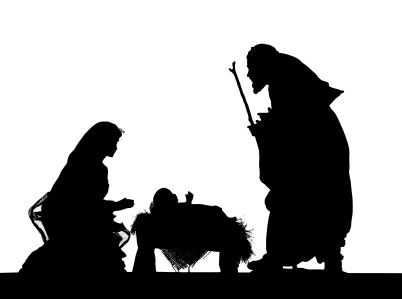 |
Christmas image 1
image source unknown |
|
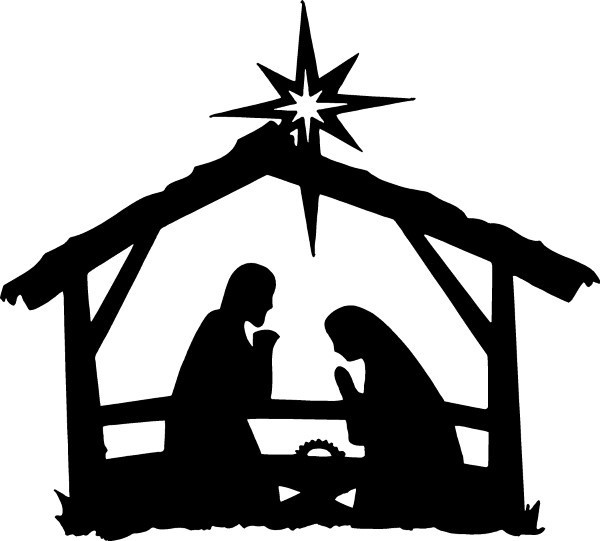 |
Christmas image 2
image source unknown |
|
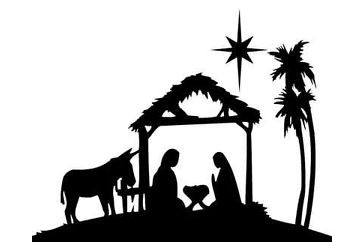 |
Christmas image 3
image source unknown |
|
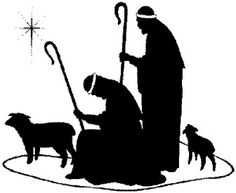 |
Christmas image 4
image source unknown |
|
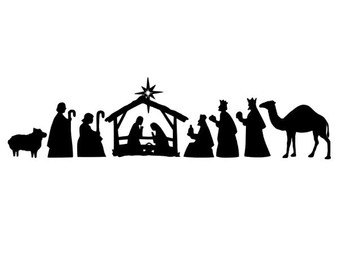 |
Christmas image 5
image source unknown |
|
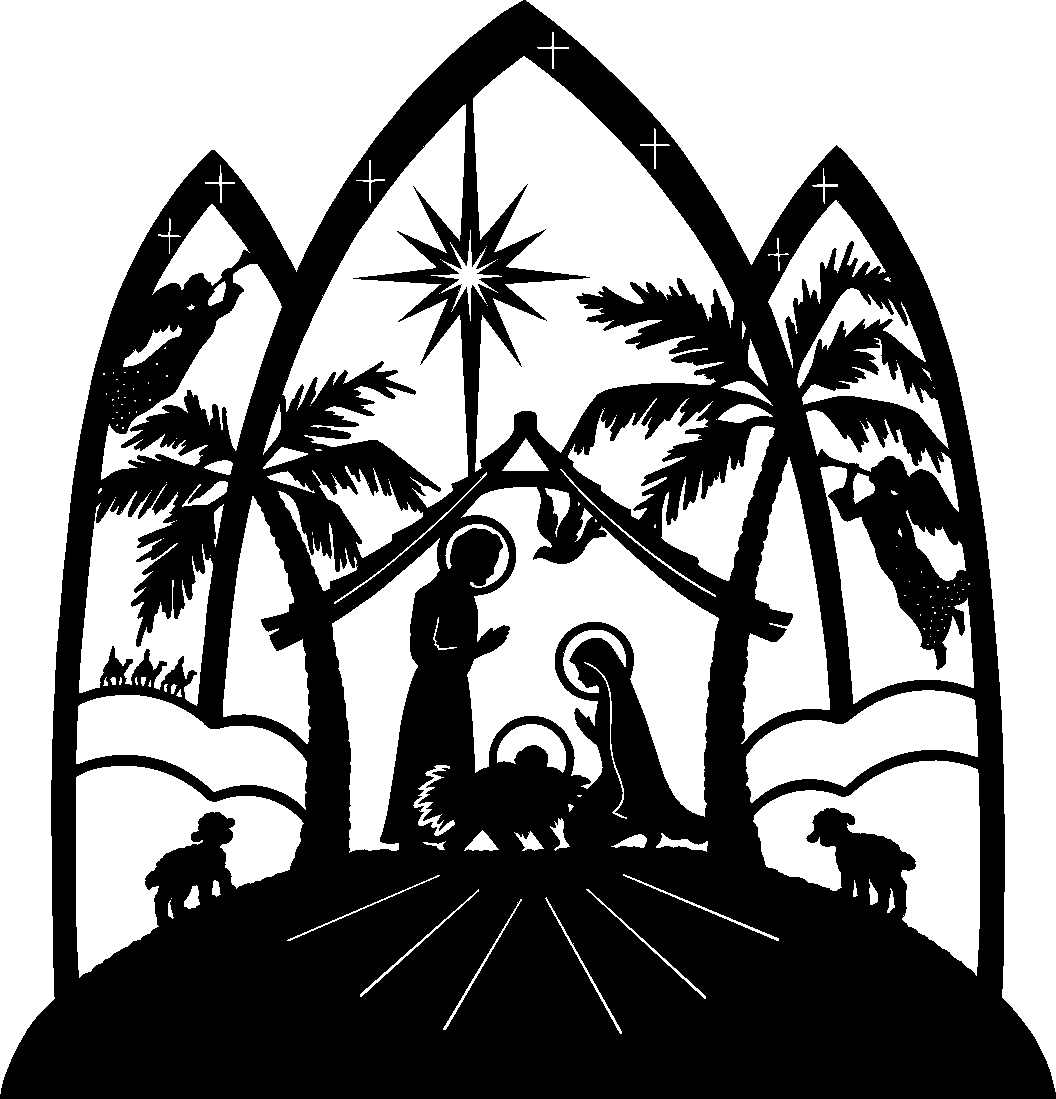 |
Christmas image 6
image source unknown |
|
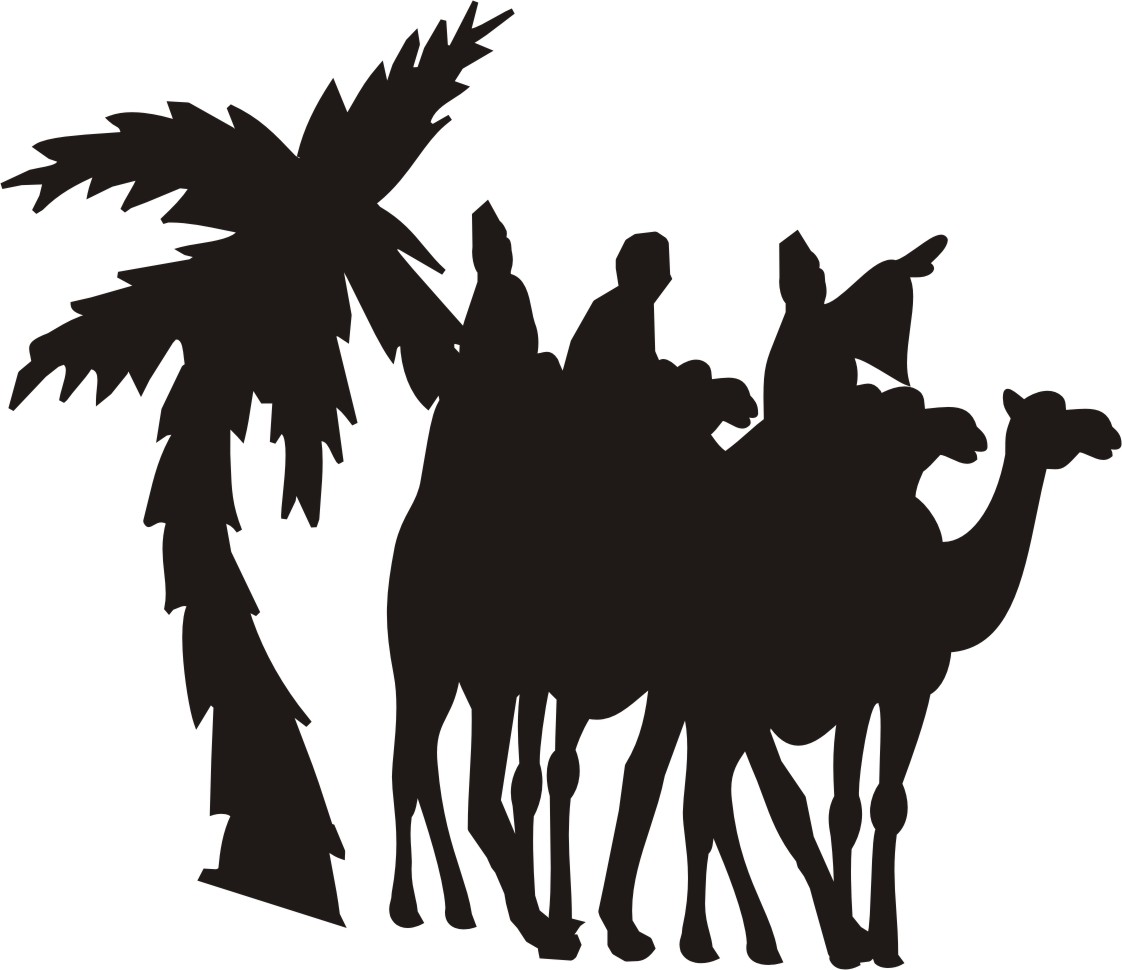 |
Christmas image 7
image source unknown |
|
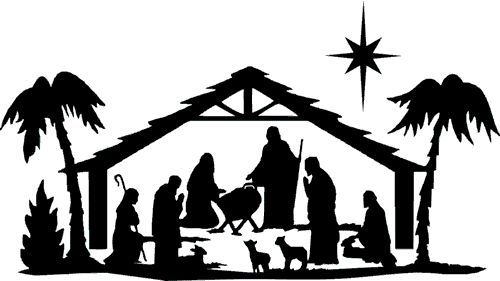 |
Christmas image 8
image source unknown |
|
| For younger children |
A Finger Poem
origin unknown
Five happy shepherds watching their sheep. (hold up five fingers)
One saw an angel and jumped to his feet. (hold up one finger)
Four barn animals sound asleep. (hold up four fingers)
One saw an angel and didn't make a peep. (one finger)
Three wise men watching the sky. (three fingers)
One saw an angel and began to wonder why. (one finger)
Two loving parents, full of love. (two fingers)
They both saw the angel and were filled with joy.
One little baby asleep in the hay. (cradle arms)
God's gift to us on Christmas day.
|
|
|








